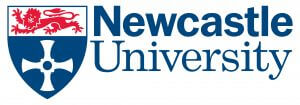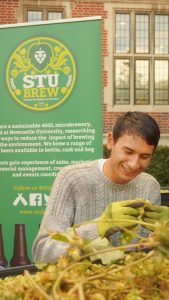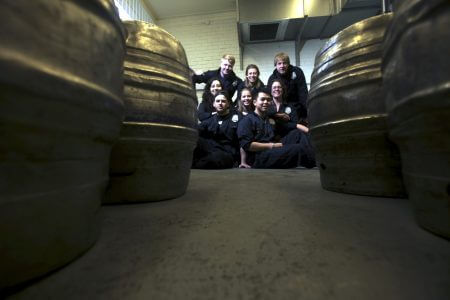EDITORIAL OVERVIEW – ISSUE 16
REIMAGINE NEWSLETTER: ISSUE 17
The University of Newcastle’s ‘Stu Brew’ project was adjudged the winner of 2017’s ‘Overall Enterprise Award’. Combining pints and pedagogy, students learn about fostering sustainable enterprise, managing long-term projects, and applying key precepts pertaining to sustainability.

Students are well-known for their love of the odd pint, but enterprising Newcastle University students are cashing in – through the launch of their own microbrewery.
Their entrepreneurial passion to set up and grow Stu Brew, Europe’s first student-run microbrewery, has been recognised with the Overall Enterprise Award at the Reimagine Education Conference and Awards. Stu Brew also picked up the Silver Award in the Sustainability category, beating competition from higher education institutions from all over the world.
The sustainable microbrewery, managed through Newcastle University Students’ Union, brings together over 200 students who manage every aspect of the business, from sourcing hops to designing the labels.
Launched in August 2013, Stu Brew became one of only 25 environmental and sustainability initiatives in the UK to be awarded funding from the National Union of Students’ ‘Student Green Fund’.
Red Kellie is a Go Volunteer Project Worker at Newcastle University Students’ Union who was instrumental in launching and developing Stu Brew. She explains: “In 2013, the National Union of Students launched a national sustainability education funding scheme called the Student Green Fund. Newcastle University Students’ Union applied for support to set seven sustainability projects, including a community orchard, market garden, youth education programme, and a student-run sustainable microbrewery.
“The idea with the microbrewery was to practically engage students with the idea of sustainable industry and socially responsible manufacturing by using a novel and unusual subject matter, something that lots of students were already very interested in – namely craft beer.
“The brewing industry is increasingly aware of, but still fairly notorious for, its environmental impact – using substantial amounts of water, energy and cleaning chemicals. As a process, it seemed to be a perfect sector to focus on. It also fired up students – currently a booming and exciting industry to work in, opportunities for both practical work experience and project management skills to be gained, and a great product to sell and be enjoyed at the end. A small team of motivated students soon gathered to get things off the ground and the enterprise has quickly grown to engage hundreds of students each year in various brewery-related activities.”
Stu Brew’s first year was dedicated to getting the enterprise set up and engaging students into leadership roles. The biggest challenges for the students were securing and preparing a suitable site for the microbrewery, arranging all of the relevant permissions and licences, and installing the necessary brewery and safety equipment. This was a major milestone which enabled the budding entrepreneurs to go into full-scale production.


Fast-forward four years, and the enterprise is managed and staffed by students supported by the Students’ Union: all brewing, casking, sales and marketing activities are undertaken by students – supported and advised by Students’ Union and University staff.
Stu Brew connects people from all areas of the university who are interested in brewing to help support our business – from the brand design to helping out on brew days. It also hosts social events once a month to give members a taste of some of our new beers.
The brewery is a 2.5 barrel facility and a 20L experimental kit for recipe design and small-scale brews. Set up with sustainability at heart, hops are grown on the student allotments and the brewing process uses a hot water recovery system to make the process more energy-efficient. Spent malt is sent to a local farmer for use as animal feed and hop residue gets composted on the allotments.
It has successfully produced 16 beers, with eight becoming core products, and six of these now produced in bottle and keg as well as cask. This is a rate of development for the brewery of which it can be justly proud as a new emerging business.
Since its launch, more than 500 students have been engaged with Stu Brew – in leadership roles to guide and deliver the microbrewery enterprise, in practical volunteering roles that lead to the development of new recipes, brew and cask beers, and through market research and academic projects linked to the brewery.
Dispelling the myth that brewing is predominantly a male occupation, and harking back to Brewster heritage, over half of Stu Brew’s members are female. Historically, it was women who would brew beer in the house, as part of the domestic chore set, and it was only when brewing became industrialised that men began to dominate.
Postgraduate student James Milne, who was last year’s Student Brewmaster and is the current Sales Manager for Stu Brew, attended the Reimagine Education Conference and Awards to present the student brewery to hundreds of delegates.
“Winning the Enterprise award and silver in Sustainability was unexpected but a great pleasure. The fact that Stu Brew is now being recognised on an international stage at the Reimagine Education conference is fantastic and a signal for even greater things to come,” said James.
Nunzio Quacquarelli, QS’s CEO and co-founder of the Reimagine Education initiative, said: “At Reimagine Education, we’re seeking to reward student-focused, employability-boosting projects that unite sustainability with scalability. Stu Brew was one of the few entries this year that excelled in all of these criteria, and our judges were impressed by the way that key learning principles were integrated into an enjoyable, engaging, effective real-world project. We will eagerly follow their progress in future, and are sure that their work will help cultivate a new generation of sustainability-minded entrepreneurs.”
Red added: “The enterprise is going from strength to strength; both in terms of beer sales across Newcastle and the North East, and with its ongoing mission to promote sustainability within the brewing industry.”

Sustainable brewery design
Operating through a partnership between Newcastle University Students’ Union and the School of Chemical Engineering and Advanced Materials, Stu Brew has cemented itself as a research unit for sustainable brewery design, seeking to become an example of good environmental practice in the brewing field.
Stu Brew works closely with academics from the school and other local microbreweries in the North East of England to improve our process and share best practice. Sustainability is one of Newcastle University’s key research areas, led by a dedicated institute.
Dr Chris O’Malley, a lecturer in Chemical Engineering at Newcastle University, who leads the research arm of the Stu Brew initiative, added: “I’m really pleased to see the team getting the recognition they deserve for all the long hours that they’re putting in to the project.
“We’ve had a busy 12 months with a rebrand last Christmas, growing our own hops and starting to sell our products in keg, cleaning research projects, career development module students, and more.
“It’ll be exciting to see what the next 12 months bring. A big thanks to the School of Engineering, Newcastle University Students’ Union and Go Volunteer for all the support – we couldn’t do it without their backing.
“Stu Brew is about more than just making beer. We are also conducting our own research into ways to make the brewing process more sustainable and engaging with the local microbrewery community to share best practice.”
One of the brewery’s projects assessed water and energy usage data using the brewery’s meter logger and observation of tasks performed in the brewery. A number of key events were identified through analysis of the data and improvements to working habits have been implemented to reduce the frequency of these events, which can have a significant impact on total water usage.
Another project analysed the performance of various cleaning procedures currently used in our microbrewery. It showed that investigations into waste product disposal – spent water, grain and yeast – should be shared among the region’s brewing network. This includes brewers’ grain used to generate energy from anaerobic digestion with a high conversion to biogas and low-cost water monitoring to reduce resource use and minimising waste throughout.
Red said: “We champion the idea that modern chemical engineers, and indeed graduates entering any sector, have to consider best practice in sustainability. Stu Brew is a ‘living lab’ but one where students learn about how sustainability can be applied to industry throughout every aspect of their practice.”

Turning ideas into successful ventures
One of Stu Brew’s key focus areas is to equip students with practical skills and knowledge. The project aims to help students gain important employability skills through running a small start-up business, and 12 students so far have completed Career Development Modules through the project in areas such as procurement, marketing, and sustainability.
Stu Brew members gain experience and knowledge of any aspect of the brewery business which is of most interest to them, or in which they have most interest. By providing access to real-life team management situations, sales and marketing experience, process management and communication with government departments and local industry partners, Stu Brew provides on-the-job learning and practical experience alongside sustainable business management.
The students have conducted their own market research, secured trademarks, and designed the labels themselves. OverDraught, the first beer produced by Stu Brew, was launched following focus groups and taster sessions with students, which helped refine OverDraught’s recipe.
In addition to helping students develop entrepreneurial and event management skills, Stu Brew has acted as a catalyst for career development. After the first 24 months of operation, a growing number of students from Stu Brew have gone on to jobs in the brewing industry, including positions within Brew Dog, Camerons, and Heineken – alongside several regional breweries. Following their collaborations with Allendale Brewery, Northern Alchemy, Three Kings Brewery and others, some postgraduate students become Brewmasters and are training their undergraduate colleagues.
The student brewers received guidance and support from START UP, Newcastle University Careers Service’s support programme for student and graduate entrepreneurs, while creators of the #StartedatNCL social media campaign highlighted the entrepreneurial achievements of those associated with the University.
Gareth Trainer, Assistant Director (Enterprise and Entrepreneurship), Newcastle University Careers Service, said: “This is a thoroughly well-deserved award that is testament to the creativity, innovation and leadership shown by the students involved. It is not just an incredibly powerful example of consumer-focussed social enterprise, but a stunning example of immersive enterprise education. Learning technical skills and knowledge in this way is very effective, but adding the commercial, business enterprise context in this sustainable, resourceful, and repeatable way boosts the development of employability and self-efficacy almost immeasurably.
“To have the idea and make it happen is challenging enough; to have scaled it into such an impactful, inclusive and enterprising educational experience is truly inspirational.”
What’s on tap for Stu Brew?
Stu Brew recently started its first fully-funded PhD research project, focusing on reducing the environmental impact of brewery cleaning processes.
Red explains: “The project will help build on our research into sustainability at a small scale and hopefully permeate the craft beer industry. It will analyse how this could lead to a positive impact for businesses and the environment.”
Student brewers are collaborating with ‘Toast Ale’, an award-winning craft beer company brewing with fresh surplus bread that would otherwise be wasted, with the aim to establish Stu Brew as a national brand.
Stu Brew is developing a new collaboration beer that uses bread to replace part of the malt bill and also coffee beans which would also otherwise have unnecessarily ended up as food waste. Its new beer is called ‘Beans on Toast’. This again plays on the student-relevant branding which sets Stu Brew apart, while also widening the horizons of the enterprise, reaching towards new ways of reducing its environmental impact, and educating the masses about sustainable choices – albeit through the medium of beer.

